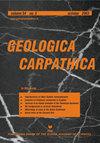斯洛伐克喀尔巴阡山脉西部Zemplinic结晶基底的变质岩:变质演化与火成岩原岩
IF 1.5
4区 地球科学
Q4 GEOSCIENCES, MULTIDISCIPLINARY
引用次数: 0
摘要
:Zemplinic前阿尔卑斯结晶基底位于西北-东南走向的构造地垒内,从东斯洛伐克盆地新生代填充物的基底隆起。其构造关系尚未明确解决,因此,这要么代表西喀尔巴阡山脉结晶基底单元向东的延续,要么属于另一个构造单元。Zemplinic变质基岩以典型的角闪岩为代表,其颜色为深色,具有强至弱叶理或线性结构。地质温度测量结果和构建的相图表明,角闪岩相的P–T层段条件为610–730°C,0.58–0.76 GPa。它们的临界矿物组合Hbl+Pl+Cpx对应于Zemplinic结晶基底造山变质作用的高潮。根据其化学成分,变质岩石的原岩对应于两个火山群:亚碱性玄武岩(Nb/Y=0.05–0.31)和碱性玄武岩(Nb/Y=0.90–1.85)。Nb N/Th N值(=0.04–0.19)表现出亚碱性变质玄武岩的“弧形”特征。不相容元素图中显示的亚碱性变玄武岩群表明,它归一化为N-MORB和E-MORB,并倾向于E-MORB玄武岩,有Zr–Hf、Ti、Y和Nb贫化的证据。另一方面,碱性变质玄武岩组倾向于更过渡到OIB玄武岩,有证据表明LREE和MREE以及Th、U、Nb、Zr、Ti和Y的富集程度更高。Zeplinic变质玄武岩包括各种富集的玄武岩,从洋内走向板内或洋内岛弧场符合弧后盆地的伸展超俯冲机制。从构造发展的角度来看,我们认为泽普利尼克单元是内西喀尔巴阡山脉的延续。本文章由计算机程序翻译,如有差异,请以英文原文为准。
Metabasic rocks from the Zemplinic crystalline basement (Western Carpathians, Slovakia): Metamorphic evolution and igneous protolith
: The Zemplinic pre-Alpine crystalline basement occur within a northwest-southeast striking tectonic horst, uplifted from the basement of the Cenozoic fill of the East Slovakian Basin. Its tectonic affiliation has not yet been clearly resolved, therefore, this either represents a continuation of the Western Carpathians crystalline basement units to the east or belongs to another tectonic unit. The Zemplinic metabasic rocks are represented by typical amphibolites, which are dark-coloured with strong to weakly foliated or lineated structures. The results of geothermobarometry and constructed phase diagrams indicate a P–T interval of an amphibolite facies with conditions of 610–730 °C at 0.58–0.76 GPa. Their critical mineral association Hbl + Pl + Cpx corresponds to the climax of the orogenic metamorphism of the Zemplinic crystalline basement. Based on their chemical composition, the protolith of metabasic rocks corresponds to two volcanic groups: the sub-alkali basalt (Nb/Y = 0.05–0.31) and the alkali basalt (Nb/Y = 0.90–1.85). The Nb N / Th N values (= 0.04–0.19) exhibit “arc” signatures for the sub-alkali metabasalts. The sub-alkali metabasalt group, which is shown in the incompatible element’s diagrams, indicates that it normalized to N-MORB and E-MORB and inclines to E-MORB basalts, with evidence of Zr–Hf, Ti, Y, and Nb depletion. On the other hand, the group of alkali metabasalts tends to be more transitional to the OIB basalts, with evidence of higher enrichment in LREE and MREE, as well as in Th, U, Nb, Zr, Ti, and Y. The Zemplinic metabasic rocks comprise a variety of enriched basalts, running from intra-oceanic towards within-plate or towards intra-oceanic- and island-arc field accord with the extensional supra-subduction regime of back-arc basins. From the point of view of tectonic development, we consider the Zemplinic Unit to be a continuation of the Inner Western Carpathians.
求助全文
通过发布文献求助,成功后即可免费获取论文全文。
去求助
来源期刊

Geologica Carpathica
地学-地球科学综合
CiteScore
2.40
自引率
23.10%
发文量
26
审稿时长
>12 weeks
期刊介绍:
GEOLOGICA CARPATHICA covers a wide spectrum of geological disciplines including geodynamics, tectonics and structural geology, volcanology, stratigraphy, geochronology and isotopic geology, karstology, geochemistry, mineralogy, petrology, lithology and sedimentology, paleogeography, paleoecology, paleobiology and paleontology, paleomagnetism, magnetostratigraphy and other branches of applied geophysics, economic and environmental geology, experimental and theoretical geoscientific studies. Geologica Carpathica , with its 60 year old tradition, presents high-quality research papers devoted to all aspects not only of the Alpine-Carpathian-Balkanian geoscience but also with adjacent regions originated from the Mediterranean Tethys and its continental foreland. Geologica Carpathica is an Official Journal of the Carpathian-Balkan Geological Association.
 求助内容:
求助内容: 应助结果提醒方式:
应助结果提醒方式:


